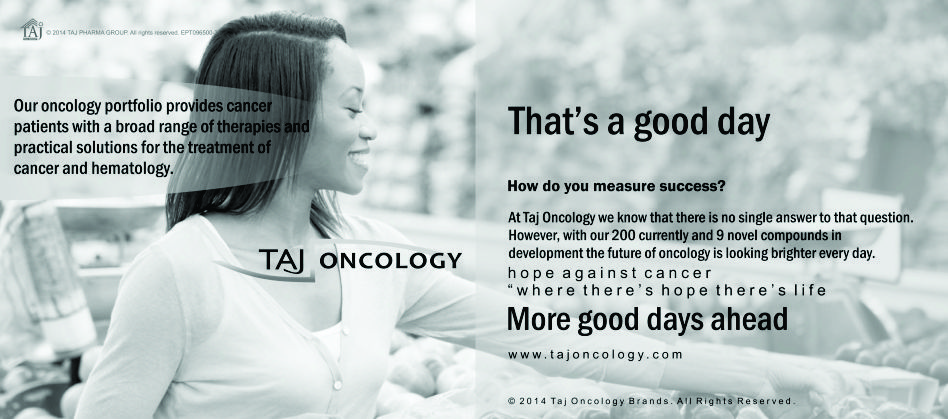Taj Pharma India (Oncology)
We are totally committed to improving the safety and wellbeing of all people who work with us, or come into contact with our operations and products.
Treatments for cancer
This section has information about all the main cancer treatments, including surgery, radiotherapy, chemotherapy, hormone therapy, biological therapies, bisphosphonates and bone marrow and stem cell transplants. There is also information about complementary and alternative therapies.
Chemotherapy
What it is?Chemotherapy literally means drug treatment. In cancer treatment it means using cell killing ( cytotoxic ) drugs. Whether chemotherapy is a suitable treatment for you, and which drugs you might have, depends on
- Your type of cancer
- What the cancer cells look like under a microscope
- Whether the cancer has spread
- Your general health
You may have treatment with a single chemotherapy drug or a combination of drugs. You may have chemotherapy on its own or with other treatments.
For some types of cancer, people have high dose chemotherapy treatment, with a drip (infusion) of stem cells or bone marrow cells afterwards. This is called a bone marrow transplant or stem cell transplant. There is information about these treatments in the bone marrow transplant and stem cell transplant section.
Chemotherapy kills cells that are in the process of splitting into 2 new cells. This is how normal body tissues grow. But cancer cells divide much more often than normal cells, so they are more likely to be killed by chemotherapy.
Chemotherapy kills dividing cells by damaging the part of the control centre inside each cell that makes it divide. Some drugs interrupt the chemical processes involved in cell division.
Chemotherapy causes side effects because it affects healthy body tissues where cells are constantly growing and dividing. These tissues include the skin, bone marrow, hair follicles and lining of the digestive system. Normal cells can replace or repair cells that are damaged by chemotherapy. So side effects caused by damage to healthy body tissues usually go away once the treatment ends.
The main ways you can have chemotherapy are as an injection, a drip into the bloodstream, or tablets or capsules. The chemotherapy drugs circulate all round the body in the bloodstream to reach the cancer cells. Doctors call this systemic treatment.
How well chemotherapy worksYou may have chemotherapy to try to cure your cancer or you may have it to control the cancer. The chance of the chemotherapy curing your cancer depends on the type of cancer you have. You may have chemotherapy on its own or with other treatments, such as surgery or radiotherapy.
Even if a cancer can’t be cured, you may have chemotherapy to help control a cancer by shrinking it, or to relieve symptoms.
- To shrink a cancer before surgery or radiotherapy (neoadjuvant treatment)
- To try to stop cancer coming back after surgery or radiotherapy (adjuvant treatment)
- As a treatment on its own in cancers that are very sensitive to chemotherapy
- To treat cancer that has spread from where it first started
Sometimes people have chemotherapy at the same time as radiotherapy. This is called chemoradiation. It can help the radiotherapy to work, but can also increase side effects.
Types of chemotherapyDoctors use chemotherapy because it circulates throughout the body in the bloodstream. So chemotherapy can treat cancer cells wherever they are. This is called systemic treatment. Surgery and radiotherapy are local treatments.
The chemotherapy drugs you have are specific to where in your body the cancer started – the type of cancer you have. Different chemotherapy drugs work on different types of cancer.
Why chemotherapy may not be suitable for youSome types of cancers are not sensitive to chemotherapy, and so your doctor won’t recommend it to treat them.
Where you have chemotherapy depends on the type of chemotherapy and what care and support you need when you are having it.
Chemotherapy at homeYou may have chemotherapy at home if
- You are taking tablets or capsules
- Your hospital or private healthcare company has home chemotherapy nurses
- You are having continuous, low dose chemotherapy through a pump that you can wear at home
If you are having chemotherapy into a vein you usually have it either at a chemotherapy day clinic or as an inpatient. Having chemotherapy in the day clinic can take anything from a few minutes to a few hours.
Some chemotherapy treatments mean a short stay in hospital. This is usually because
- You need to have the treatment slowly
- You need to have extra fluids through the drip along with the drug
- You need to be monitored during the treatment
If you are having high dose chemotherapy treatment you may need to stay in hospital for longer, perhaps for a few weeks. This is because the treatment is more intensive and has more side effects. Staying in hospital means that your doctor or nurse can pick up and treat any problems quickly,including infections.
Radiotherapy
What it is?Radiotherapy means the use of radiation, usually X-rays, to treat illness. X-rays were discovered in 1895 and since then radiation has been used in medicine for diagnosis and investigation (X-rays) and treatment (radiotherapy).
Doctors have a lot of experience using radiotherapy in medicine. About 4 out of 10 people with cancer (40%) have radiotherapy as part of their treatment. It can be given in various ways
- From outside the body as external radiotherapy, using X-rays, cobalt irradiation, electrons, and more rarely other particles such as protons
- From within the body as internal radiotherapy, by drinking a liquid that is taken up by cancer cells or by putting radioactive material in, or close to, the tumour
Radiotherapy destroys the cancer cells in the treated area by damaging the DNA within these cells. Although normal cells are also affected by radiation, they are better at repairing themselves than the cancer cells.
You usually have radiotherapy as a series of treatments over a number of days or weeks. Each treatment is known as a fraction. Fractions are usually given once a day from Monday to Friday with a rest at the weekend to help normal cells recover. Healthy cells that are damaged are often replaced as part of the bodies' repair systems. This depends on the type of cell and the dose of radiotherapy. But if cells can't be replaced, can sometimes be permanent.
You may feel anxious about radiotherapy and this is perfectly normal. It can help to talk through any worries you have with your doctor, nurse or radiographer. There is detailed information about feelings, emotions and radiotherapy in the general radiotherapy side effects section.
Surgery
Surgery to treat cancerSurgery means cutting away tissue from the body during an operation. You may have surgery as an inpatient or an outpatient. It usually means having either a local anaesthetic or general anaesthetic. You may have surgery for any of the following reasons
- To diagnose cancer – a small sample of tissue is taken to examine under a microscope
- As a treatment to cure cancer
- To rebuild (reconstruct) a part of your body
- To prevent or reduce the risk of cancer
- To control symptoms or extend life
- As part of other treatments, such as having a central line put in
Whether surgery is a treatment option for you depends on your type of cancer, how big the cancer is, and where it is in the body, as well as your general health.
Surgery is likely to cure many small early stage cancers and may be the only treatment you need. For some cancers you have other treatments such as chemotherapy or radiotherapy before or afterwards. These treatments may shrink a tumour to make it easier to remove or may lower the chance of the cancer coming back.
Surgery is not usually used to treat cancers involving the blood system (such as leukaemias and some types of lymphoma). It is also not usually an option if your cancer is advanced or if the cancer is near a blood vessel or other delicate tissue. In this situation it may cause too much damage.
If you are going to have an operation for cancer your doctor will explain what it involves and will tell you about any possible after effects.
Hormone Therapy
What Hormone therapy areHormones are natural substances (proteins) made by glands in our bodies. Hormones are carried in our blood and act as messengers between one part of our body and another. They have many effects, including controlling the growth and activity of certain cells and organs.
Some cancers use hormones to grow. These cancers are called hormone sensitive or hormone dependent. Hormone therapy uses drugs that either stop the body producing hormones or prevent hormones from making the cancer cells grow and divide. Cancers that can be hormone sensitive include breast, prostate, womb and kidney cancers.
There are a number of different types of hormone therapy. The type you have depends on a number of factors, including your type of cancer.
Taj Pharma Group
A dream for new world Anchored in India and committed to its traditional values of leadership with trust, the Taj Pharma Group is spreading its footprint globally through excellence and innovation.
Each operating company in the group develops its international business as an integral element in an overall strategy, depending on the competitive dynamics of the industry in which it operates. For some businesses a focus on the export market remains the priority. For others it is developing a robust presence in domestic markets given growing population of India. And then there are Group companies, a small but growing number, that have global ambitions; additionally, synchronizing these ventures to cater Indian market remains a priority for growth.
Exports from India remain the cornerstone of the Taj Pharma Group’s international business, but different Taj companies are increasingly investing in assets overseas through Greenfield projects (such as in Spain, Germany, Middle East, Africa, Russia, and CIS Countries), joint ventures (in Sri Lanka, UK) and acquisitions.
While individual Taj companies have differing geographical imperatives, the Taj group is focusing on a clutch of priority countries, which are expected to be of strategic importance in the years ahead. The regions are UK, Sri Lanka, the Netherlands, Germany, South Africa, members of the Gulf Cooperation Council, Brazil, Vietnam, Thailand and Taiwan.
Dr. R.K.Singh, Chairman, Taj Pharmaceuticals Limited., sums up the Taj group’s efforts to internationalize its operations thus: “We hope that a several years from now we will spread our wings far beyond India, that we become a global group, operating in many countries, an Indian business conglomerate that is at home in the world, carrying the same sense of trust that we do today." We have already progressed on such efforts by our current presence in more than 40 countries.









